Top 10 HRM Management Softwares For Business To Know In 2026

Looking for HRM management software in 2026 that actually works for your business? Tired of clunky tools that don’t scale or fit your team? This MOR Software’s guide rounds up the top HRM human resource management software solutions that real HR teams are using to drive results. Whether you need software for HRM management, boost employee engagement, or automate time-consuming tasks, these picks are worth your shortlist.
What Is HRM Management Software?
HRM management software is a digital system that helps businesses handle key tasks like hiring, payroll, employee records, and performance tracking, all in one place. It’s used by HR teams, managers, and sometimes employees themselves to simplify day-to-day HR operations.
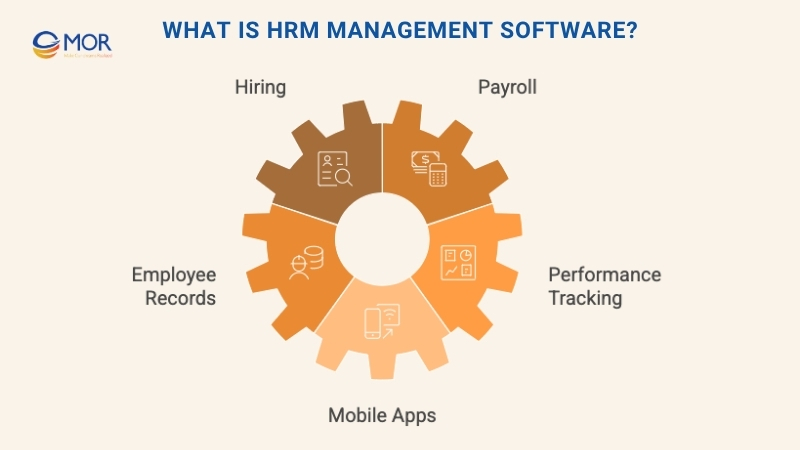
Today’s leading platforms often come with companion mobile apps. Employees can request time off, view pay stubs, or update their contact details directly from their phones. For HR staff, mobile tools support things like remote hiring, tracking staff performance, or updating records on the go, especially useful in fast-paced teams or when using a larger HRM human resource management software system.
These tools aren’t just for large enterprises anymore. Even small teams can benefit from software that keeps everything organized and accessible, anytime, anywhere.
HRM Management Softwares Trends To Watch In 2026
Workplaces are changing fast, and so is the technology that supports them. In 2026, HRM management software is shifting from basic admin tools to intelligent systems that improve how companies hire, manage, and support people. Here are five trends worth tracking:
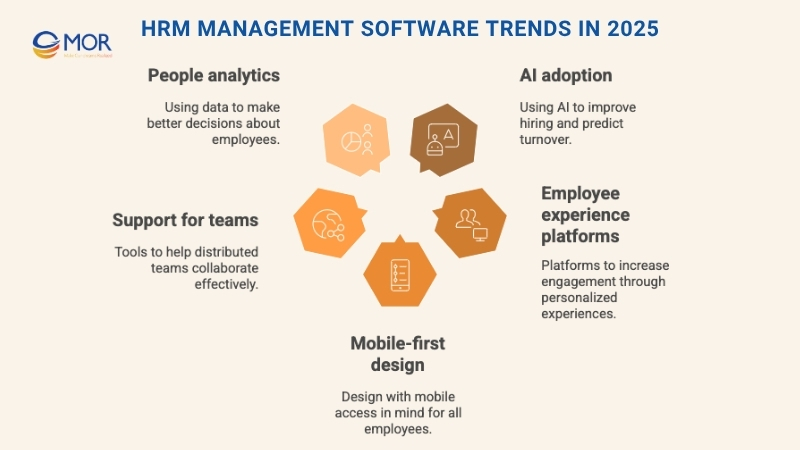
Artificial Intelligence Gets Practical
AI isn’t just hype anymore. Smart software for HRM now uses AI to handle repetitive tasks like resume screening, schedule planning, and even predicting turnover risks. These tools free up HR teams to focus on people, not paperwork.
All-in-One Employee Experience Platforms
More businesses want one place to manage everything from onboarding to feedback. Modern human resource management HRM software is moving toward experience-driven design, clean interfaces, personalized dashboards, and tools that actually help people stay engaged.
Mobile-First Becomes the Standard
With remote and frontline work on the rise, mobile access is now a must. Top HRM platforms are leading with mobile design, giving users fast, secure access to schedules, requests, and profiles right from their phones.
Support for Distributed Teams
Remote work isn’t going away. In response, HR tools are adding features that help track performance, run meetings, and manage time zones across multiple locations. That means smarter dashboards, built-in chat, and real-time visibility.
Data-Driven HR with People Analytics
Instead of guessing what works, teams now want proof. People analytics features in HRM management softwares are helping HR leaders track trends, measure performance, and make better calls based on real numbers, not gut feelings.
In short, HR tools are getting smarter, more mobile, and more people-focused. If your current system can’t keep up, it might be time to look ahead.
Key Benefits Of Using HRM Management Softwares
Modern businesses need more than spreadsheets and manual forms to manage people. That’s why HRM management software has become a must-have, not just for large companies, but for teams of all sizes.
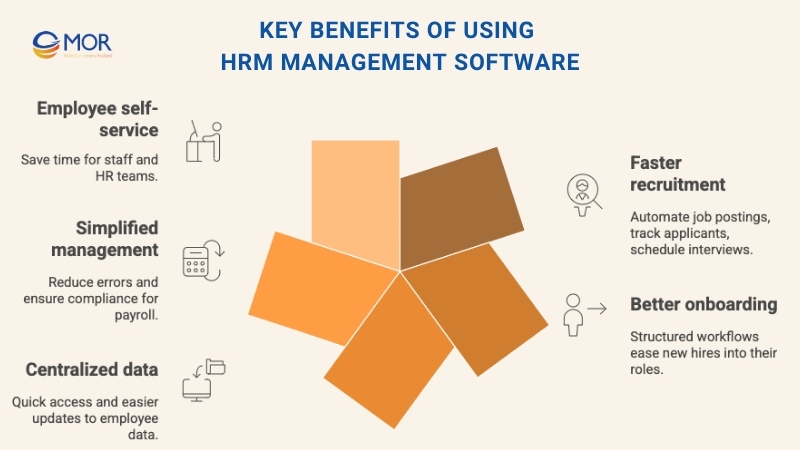
If you’re considering switching to software for HRM management, these are the five benefits that make the biggest difference:
- Faster Recruitment: Posting jobs, tracking applicants, and setting up interviews can eat up hours. HR tools speed things up by automating those steps and giving hiring managers better visibility.
- Smoother Onboarding for New Hires: A well-designed onboarding flow helps new employees feel confident and productive from day one. Good HR software handles task lists, policy sign-offs, and team introductions in one place.
- All Employee Data in One Place: No more chasing files across folders or email threads. Centralized employee records make it easy to find and update info, whether you’re prepping for audits or planning promotions.
- Payroll and Benefits Without the Headaches: Errors in payroll are costly. HRM systems take care of calculations, tax compliance, and benefits tracking, so your team doesn’t have to do the math manually.
- Self-Service for Employees: When employees can view pay stubs, request leave, or update their profiles on their own, they save time, and so does HR. That self-service piece is a small change with a big impact.
Smart HR teams aren’t just using software to save time. They’re using it to run HR more strategically and support the people behind the business.
Top 10 HRM Management Softwares Driving Business Success In 2026
HR teams aren’t just managing payroll anymore. These are the HRM management softwares platforms we pick for 2026. Each one brings practical tools that support real business growth without adding complexity.
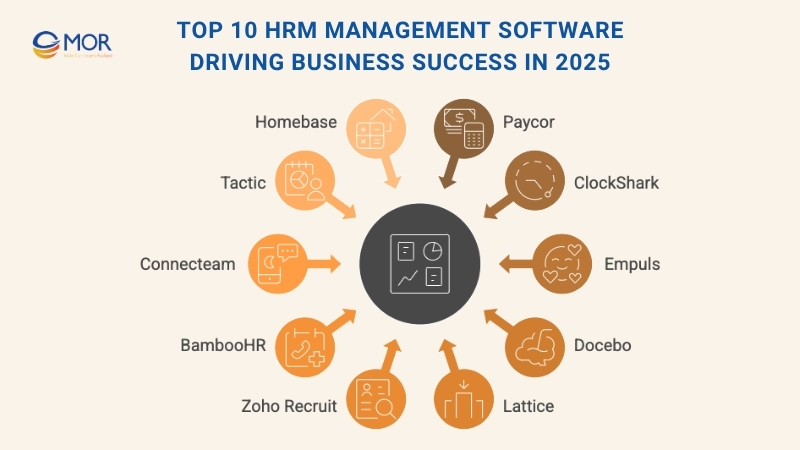
1. Paycor – Payroll-Focused HRM Management Software
Paycor is a popular pick for companies that want payroll to run like clockwork. Designed for small and mid-sized teams, it simplifies payroll, tax compliance, and employee management from one central hub.
This HRM management software focuses heavily on making payroll faster, more accurate, and less stressful. Employees can access pay info through a mobile app, and HR teams get tools to manage everything from direct deposit to benefits tracking.
One reason businesses choose Paycor? It’s clean, intuitive, and ready to scale as your headcount grows.
Key Features:
- Full-service payroll with automated tax filing
- Direct deposit and payroll reporting
- Mobile app with employee self-service portal
- Integration with time tracking, benefits, and general ledger systems
Pros:
- On-the-go payroll access through mobile
- Supports the full payroll lifecycle
- Helps employees manage their pay and benefits directly
Cons:
- Pricing details are custom and can be high for small teams
- Advanced modules may require add-on fees
This tool fits best if you want HRM management software that’s payroll-first, but flexible enough to cover other HR tasks, too.
2. ClockShark – HRM Software for Mobile and Field Teams
If you’ve got crews working in the field or across multiple job sites, ClockShark helps track time, locations, and tasks without messy spreadsheets.
Built specifically for construction and field service businesses, this HRM management software stands out for its GPS tracking, offline capabilities, and simple crew clock-ins. It's ideal for teams that aren't behind desks but still need accurate reporting.
Key Features:
- Mobile time tracking with GPS
- Offline tracking mode for low-signal areas
- Crew management from one device
- Job and shift management tools
Pros:
- Accurate GPS data for mobile teams
- Offline mode works without internet
- Easy to clock in multiple workers at once
Cons:
- Sync delays in weak connectivity zones
- Fewer pricing tiers than other platforms
ClockShark is best suited for field-based companies that need reliable, mobile-ready software for HRM that works where the team actually works.
3. Empuls – HRM Management Platform for Engagement
If your goal is to build a stronger culture and keep your team motivated, Empuls is built for that. This HRM management software focuses on employee experience, with tools for recognition, feedback, and internal communication all in one place.
You’ll find engagement surveys, wellness perks, and a rewards marketplace designed to improve morale without adding extra work to HR’s plate. It’s ideal for growing companies that want to foster a connected, engaged team.
Why it stands out:
Empuls isn’t trying to be everything. It’s laser-focused on people-first engagement, making it a great companion to more admin-heavy human resource management hrm software platforms.
Key Features:
- Social intranet and team chat
- Engagement surveys and analytics
- Customizable reward and recognition tools
- Perks marketplace and wellness benefits
Pros:
- Built-in feedback and reward tools
- Works well with existing HR systems
- Affordable plans and free trial
Cons:
- May require contracts for certain features
- Setup support might add to cost
For companies that already have the basics in place, Empuls adds the culture layer your team needs.
4. Docebo – Learning-Driven HRM Solution
Docebo brings smart learning to your HR strategy. It’s a scalable platform that uses AI to personalize training paths, automate course delivery, and offer branded mobile learning experiences.
This HRM management software is a top pick for companies serious about continuous development. Whether you’re training new hires or upskilling managers, Docebo delivers clean UX, deep analytics, and flexible content tools.
Why it stands out:
Many platforms offer training modules. Docebo goes further by letting you build a custom-branded mobile app that fits right into your internal systems, a smart move for larger teams or fast-growing businesses.
Key Features:
- AI-powered content delivery
- Mobile-first experience with custom branding
- Gamification and social learning tools
- Robust course tracking and analytics
Pros:
- Custom app branding for a seamless experience
- Detailed reporting tools for learning progress
- Strong AI support for learning recommendations
Cons:
- May not fit small teams due to user minimums
- Setup and implementation services can be pricey
If you're looking for HRM software that elevates learning, Docebo makes employee development feel modern and scalable.
5. Lattice – HRM Platform for Performance Reviews
If your team values feedback, growth, and high performance, Lattice delivers the right toolkit. This HRM management software focuses on performance management and employee development, making it a go-to for companies that want to grow from within.
It helps HR teams run performance reviews, track goals, manage compensation cycles, and gather real-time feedback, all in one flexible system. Lattice also supports pulse surveys and analytics to help measure employee satisfaction and engagement.
Why it stands out:
Lattice is built for teams serious about performance. It makes it easier to give timely feedback, set clear OKRs, and recognize progress without adding admin burden.
Key Features:
- Customizable performance reviews and OKRs
- Pulse surveys and engagement tracking
- Real-time feedback and one-on-ones
- Compensation and career path management
Pros:
- Strong reporting from surveys and feedback
- Highly adaptable for different org structures
- Seamless integrations with software for hr systems
Cons:
- Some limitations in reporting customization
- Fewer integrations than other tools in this list
For growing teams that prioritize continuous feedback and structured reviews, Lattice is a top contender.
6. Zoho Recruit – Recruitment Automation in HRM Software
Hiring doesn’t have to be slow or messy. Zoho Recruit is built to automate the entire hiring process, from job posting and candidate tracking to interview scheduling and onboarding.
It’s ideal software for HRM management teams that want to save time and reduce manual work. With features like resume parsing, candidate scoring, and workflow automation, Zoho Recruit fits in seamlessly with modern recruitment strategies.
Why it stands out:
What makes Zoho Recruit shine is its ability to do more with less. Its automation tools take repetitive tasks off your plate, so you can focus on finding the right people faster.
Key Features:
- Smart resume parsing and candidate scoring
- Job posting to multiple channels
- Automated recruitment workflows
- Strong integration library for sourcing and CRM
Pros:
- Automates repetitive recruitment tasks
- Broad integration with job boards and apps
- Great value with free and affordable plans
Cons:
- Some learning curve for advanced features
- Premium features may require extra fees
If you’re looking for HRM management software that improves hiring speed and accuracy, Zoho Recruit is a smart choice for modern teams.
7. BambooHR – Workforce-Centric HRM Management Software
BambooHR gives small and mid-sized businesses a complete HR toolkit that’s simple to use and built for modern teams. It’s especially strong in mobile workforce management, giving employees and managers full access on the go.
From hiring to performance tracking, this HRM management software keeps everything organized. It’s a favorite for businesses looking for an intuitive platform that works wherever their teams work.
Why it stands out:
BambooHR combines flexibility and function. Its mobile app handles time tracking, employee records, and performance reviews, perfect for companies with hybrid or dispersed teams.
Key Features:
- Mobile time tracking and notifications
- Instant access to employee data
- Performance review and approval flows
- Hiring and onboarding tools
Pros:
- Mobile-first and user-friendly
- Easy for employees to manage their own info
- Centralized employee database
Cons:
- Fewer customization options than some tools
- Plans start at five users minimum
If you're looking for HRM human resource management software with mobile power and clean UX, BambooHR makes managing people simple, even on the move.
8. Connecteam – Deskless Team HRM Management Software
Connecteam was made for teams that don’t work from a desk. Think retail, construction, hospitality, logistics, anywhere your staff is always in motion.
This HRM management software gives you scheduling, time tracking, chat, and task assignments all from one app. It’s built mobile-first and scales fast, making it a great fit for growing operations.
Why it stands out:
Most HR software forgets about deskless teams. Connecteam doesn’t. It gives frontline workers the same access and clarity office staff expect, right from their phones.
Key Features:
- Shift scheduling and time tracking
- Employee chat and announcements
- Task and checklist management
- Real-time reporting
Pros:
- Strong support for non-desk teams
- Flat pricing for up to 30 users
- Works great on mobile devices
Cons:
- Not ideal for teams needing deep HR admin tools
- Might be too narrow for office-based workflows
If your staff works in the field, Connecteam delivers one of the most complete mobile solutions in the HRM management software space.
9. Tactic – Hybrid Work and Desk Booking HRM Solution
Tactic is a workplace coordination platform built for hybrid teams. It helps companies plan desk bookings, room usage, and in-office schedules without confusion.
As flexible work setups grow, HRM management software like Tactic becomes essential for tracking space usage and making hybrid workdays run smoother.
Why it stands out:
Tactic makes it easy to manage desks and meeting spaces in real time. HR and operations teams get data on usage trends, helping them plan smarter and reduce unused space. It's the kind of software for HRM management that supports collaboration without adding friction.
Key Features:
- Desk and meeting room reservations
- Visitor check-ins and office security
- Mobile app for on-the-go access
- Usage analytics for smarter planning
Pros:
- Real-time visibility on workspace availability
- Clean, intuitive mobile interface
- Helps streamline hybrid schedules
Cons:
- Takes time to set up for larger offices
- Fewer customization options compared to competitors
If you're building a flexible work model, Tactic brings structure without extra admin.
10. Homebase – HRM Management Software for Hourly Teams
Homebase focuses on the daily challenges of running hourly teams, scheduling, time tracking, payroll, and hiring, especially for small businesses.
This HRM management software replaces spreadsheets and guesswork with clean, connected tools designed for speed and accuracy.
Why it stands out:
Whether you're running a cafe, salon, or retail shop, Homebase is practical software for HR tasks like managing shifts, covering absences, or calculating payroll in minutes.
Key Features:
- Smart shift planning and coverage alerts
- Real-time clock-ins from any device
- Built-in hiring and onboarding tools
- Integrated payroll and timesheet sync
Pros:
- Great free plan for small teams
- Easy to edit and publish schedules
- Connects with most major payroll platforms
Cons:
- Onboarding tools only in higher-tier plans
- UI could be more polished in some areas
For teams that move fast and change shifts often, Homebase keeps your people and processes on the same page.
How To Choose the Right HRM Management Softwares for Your Team?
Picking the right HRM management software isn’t about chasing the trendiest app. It’s about finding a tool that fits your business needs, team size, and long-term goals.
We’ve broken down the key things to look for when evaluating options, so you don’t waste time (or budget) on something that won’t scale.
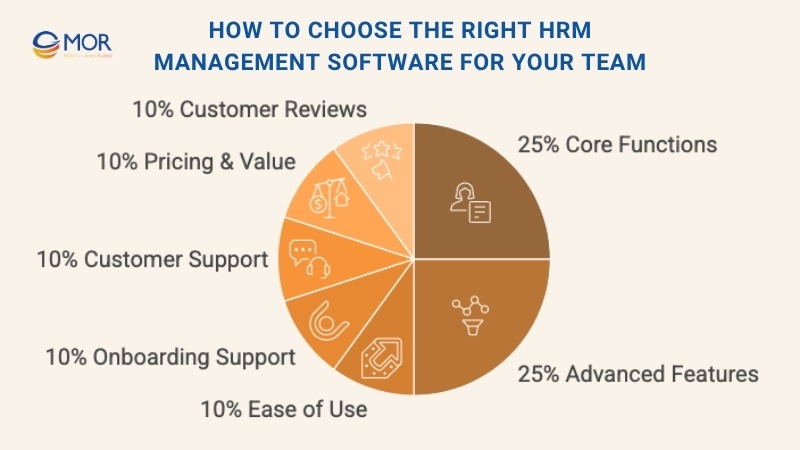
Core Functions (25%)
Start with the basics. If the app doesn’t check these boxes, move on:
- Store and manage employee records
- Track time and attendance
- Run payroll with accuracy
- Handle benefits administration
- Stay compliant and generate reports
- Access from mobile devices anytime
Every good software for HRM should at least cover those tasks.
Extra Features That Make a Difference (25%)
Some tools go further with smart extras. These standouts are worth noting:
- Real-time feedback and performance tools
- Strong mobile app (iOS and Android)
- Custom workflows for unique processes
- Built-in analytics and dashboards
- Integrations with ERP, CRM, or project management apps
These capabilities turn basic HRM human resource management software into a full digital HR hub.
Ease of Use (10%)
No one wants to spend weeks training the team. Look for:
- A clean interface
- Simple navigation
- Drag-and-drop schedulers or dashboards
- Quick links to the most-used tasks
If it feels clunky on day one, it’s not going to get better.
Onboarding Experience (10%)
Even the best tools are useless without a solid start. Good onboarding includes:
- Product tours and tutorials
- Helpful video explainers and guides
- Easy data import
- Real-time support (or at least a chatbot that works)
Customer Support (10%)
Support can make or break your experience, especially during setup. What to check:
- Live chat, phone, and email availability
- Response times and availability hours
- Clear documentation or user forums
- Consistent product updates and service continuity
Pricing & Value (10%)
Don’t just go by the price tag. Look at what you’re actually getting:
- No surprise fees
- Flexible plans that grow with your team
- Free trials or demos
- Fair balance between features and monthly cost
Customer Reviews (10%)
Last, see what other users say. Real feedback gives a better picture than a sales page. Focus on:
- Overall satisfaction trends
- Specific praise or recurring complaints
- Evidence that the vendor listens and improves
- Reviews from businesses similar to yours
Choosing human resource management HRM software shouldn’t feel like a gamble. With the right checklist, you can find a solution that handles the admin work, supports your team, and scales with you.
HRM Management Softwares Pricing & Plan Comparison
Not all HRM management softwares plans are created equal. Here’s a quick look at what to expect across pricing tiers, so you can match features to your business size and goals.
Plan Type | Typical Cost | What’s Included |
Free Plan | $0 | Core HR tasks, limited users, self-service tools for staff |
Basic Plan | $50–$100/month | Time tracking, payroll basics, simple reports |
Professional Plan | $100–$200/month | Benefits management, performance tracking, added security |
Enterprise Plan | Custom quote | Full platform access, advanced analytics, integrations, and priority support |
Which one’s right for you?
Startups or teams under 10 might get by on a free or basic plan, especially if you’re focused on core admin tasks. But once you need analytics, performance tools, or integration with other platforms, you’ll likely want to step up.
The higher the tier, the more automation, customization, and insight you get, which usually pays off in time saved and fewer HR headaches down the road.
MOR Software Helps Businesses Build The Right HRM Management Softwares
Most off-the-shelf HR tools cover the basics. But if you're dealing with complex workflows, strict compliance needs, or a fast-growing team, you might need more control. That’s where MOR Software steps in.
We specialize in building custom HRM management softwares from the ground up or extending what you already have. Whether you're looking to automate onboarding, connect payroll to your ERP, or develop a full HR suite with time tracking, leave management, and performance reviews, we’ve got the team for it.
- Dedicated developers skilled in HR systems
- Full-stack expertise: Java, .NET, PHP, React, and more
- Enterprise-grade security and scalable infrastructure
- Flexible team models: offshore, nearshore, or hybrid
We’ve supported startups, enterprises, and everything in between. If you’re serious about building HR software that fits your operations, not the other way around, we’re ready to talk.
Contact MOR Software to explore your next HRM solution.
Conclusion
Choosing the right HRM management softwares isn’t about ticking boxes. It’s about finding tools that truly make work easier. From payroll to performance reviews, mobile access to compliance, the right platform should support how your business runs. Want to build something that fits your people, not just your process? Contact MOR Software to start your custom HRM build.
MOR SOFTWARE
Frequently Asked Questions (FAQs)
What are the best HRM management software tools for small businesses?
If you’re running a small business, look for tools that are easy to learn, priced fairly, and packed with time-saving features. Popular choices include Paycor for payroll and benefits, BambooHR for people data and hiring, and Zoho People for leave tracking and attendance. Each one offers scalable tools without overwhelming your team.
Can HRM software really improve employee engagement?
Yes. Tools like Lattice and Empuls are built to boost morale through feedback, recognition, and performance tracking. These platforms make it easier for managers and employees to stay aligned, which keeps people more engaged and motivated.
Do HRM platforms help with labor law compliance?
Most modern HRM tools have built-in compliance features. Paycor, for example, includes tax reporting, labor law updates, and tools that guide you through regulatory requirements. You also get alerts and templates to help stay audit-ready.
Are recruiting and onboarding features included in HRM software?
Definitely. Apps like Zoho Recruit and Workable are strong at handling the entire hiring process, from posting jobs to managing interviews. Some tools even offer digital onboarding checklists, so new hires don’t fall through the cracks.
What reporting features should I expect from HRM tools?
Expect detailed dashboards and reports on everything from employee performance to turnover trends. Connecteam and ClockShark, for example, give you data on scheduling, attendance, and workforce behavior, helping you spot patterns and make smarter decisions.
Rate this article
0
over 5.0 based on 0 reviews
Your rating on this news:
Name
*Email
*Write your comment
*Send your comment
1